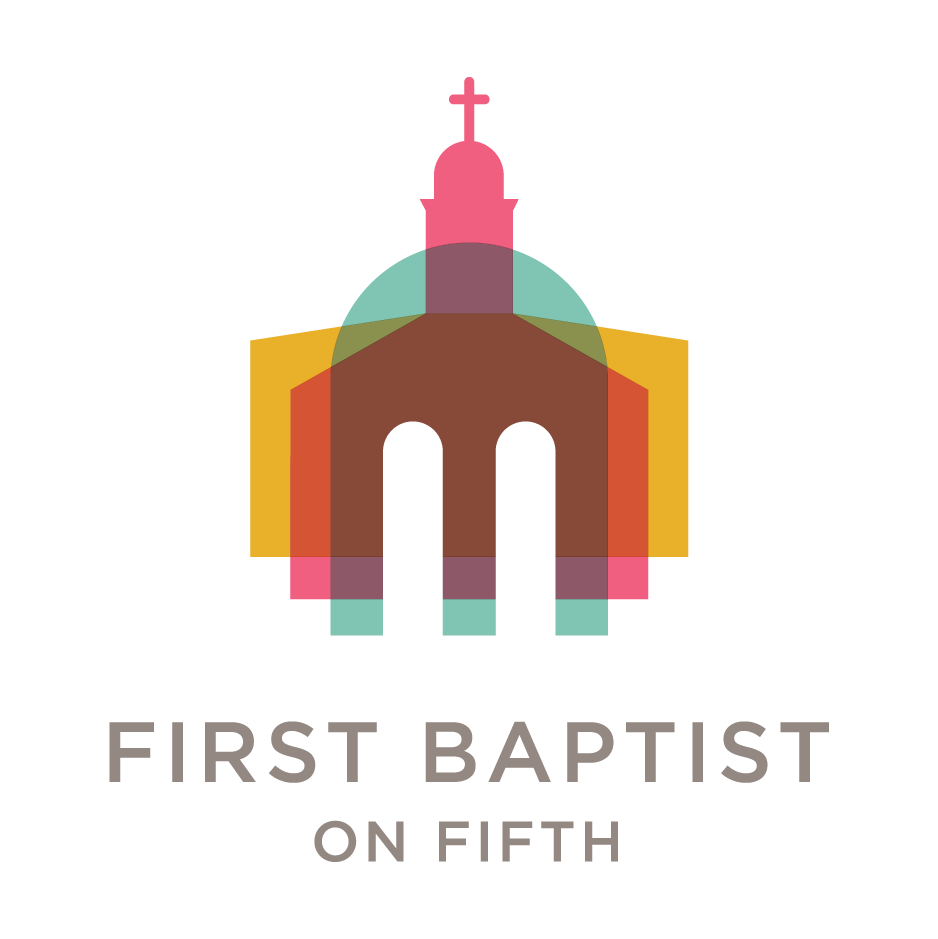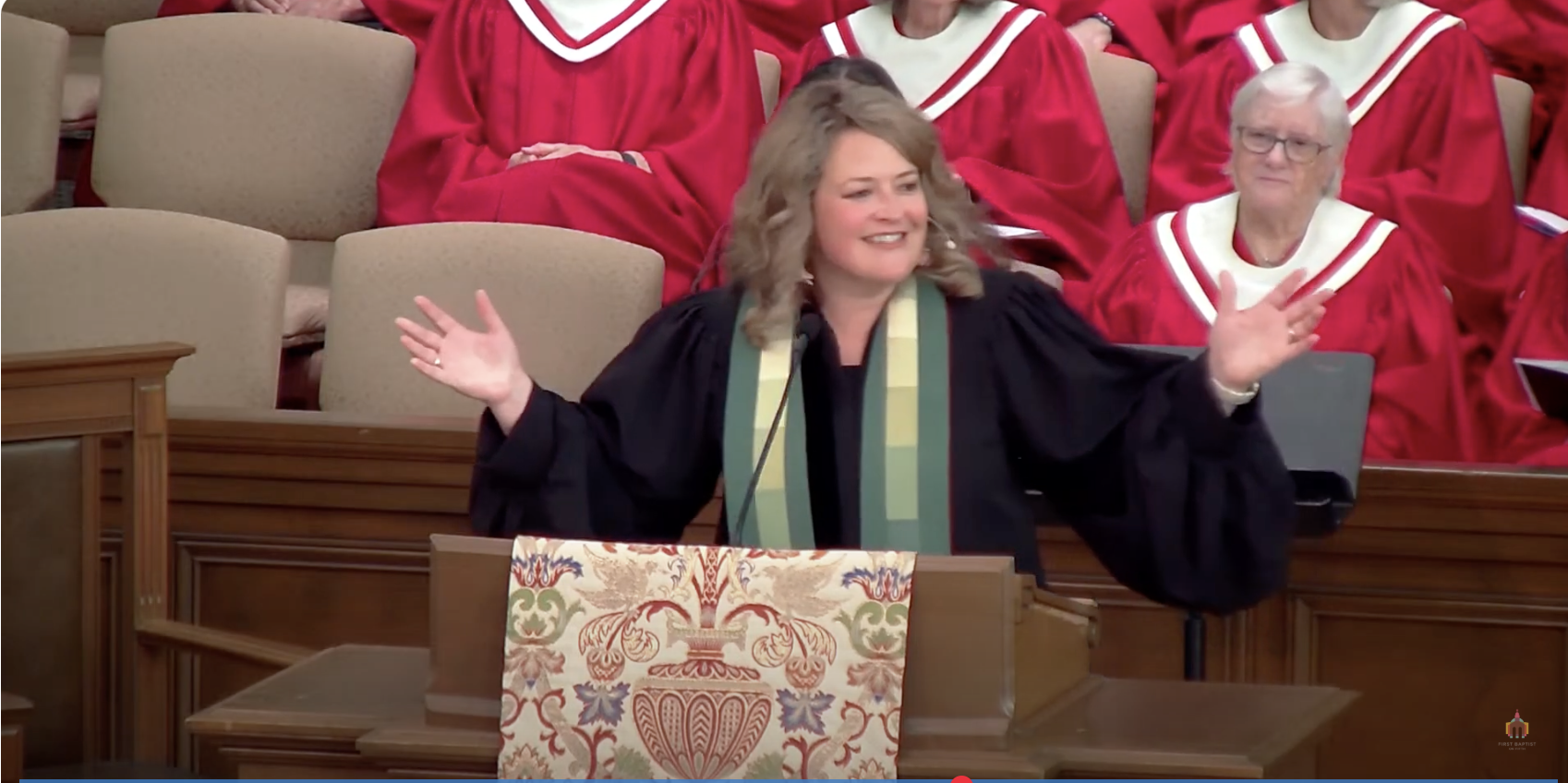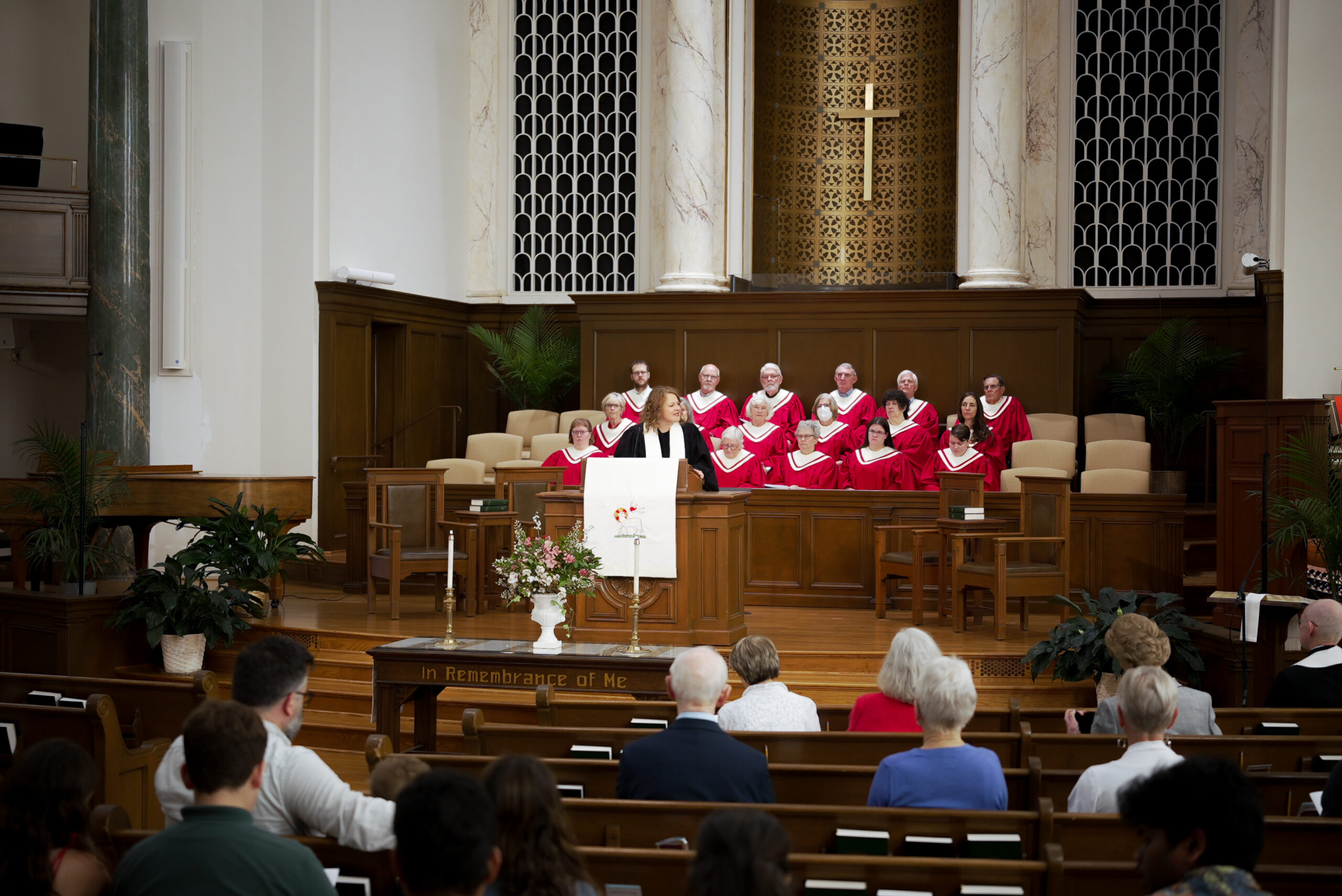Thank you, Emily, for the warm welcome. And thank you to my mom and dad for thinking that this was a good idea.
It’s an honor, and frankly a little freaky to be standing here. And when I say freaky, I mean freaky like the movie Freaky Friday, the Lindsay Lohan version if you are my age, the Jodi Foster version if you’re a little older. In either case, a kid and their parent mysteriously swap bodies and then all chaos breaks loose.
Hopefully we can skip the chaos but look: I spent a lot of hours in these pews as a kid, listening to my dad preach. A lot of services, a lot of sermons.
I will say – and this is no criticism of my dad – you do have to find some ways to pass the time during church as a teenager. I don’t think I’m breaking news here. I had some strategies. Identifying the exact middle of the hymnal by starting with the first page and the last page and turning them one at a time until your fingers meet. Doodling in the friendship pad. By the time I was allowed to sit in the balcony, I had the ability to imagine elaborate and unfortunate things happening to members of the choir. In one scenario, those golden vases above the organ would sort of tilt over and pour water all over the heads of whatever sopranos and altos sat below. It wasn’t personal. Just a lively imagination and a lot of church.
The ultimate worship hack, though, I was only able to pull off once or twice. Because, see, it required not one but two doors to be left unlocked.
If not one but two doors were left unlocked, a middle schooler could leave the service as if going to the bathroom and then let themselves into the baptismal pool. And then you could sort of crawl into the bottom of the pool and lay there on your back, fully present but fully undetected. Listening as much as you wanted, drifting off to wherever your heart might take you.
And maybe this is a better question for therapy than the pulpit but I do wonder: what kind of kid goes to such lengths to sneak out of church, only to slither back in via the baptismal pool? Maybe in my Middle School spirit, it was just enough rebellion – to be in worship but invisible?
Looking back, that idea of hiding in the pool has become something of an icon for me, the crystallization of a particular moment.
Because, of course, I was just at the beginning of understanding myself to be gay, and understanding how hard that was going to be for me, for my family, for so many of us. So I was hidden in the walls of this sacred space, present, but right on the edge. Listening, not listening.
“Buried to sin,” said the baptismal liturgy says, as a person disappears under the water. “Raised to new life,” as you broke forth again. But what if you chose to stay down there indefinitely, hidden?
In the end, I didn’t, of course. Couldn’t. But I did move further and further and further away, in search of a space that could reconcile all of those ill-fitting pieces.
***
There’s a triad of primary characters in Jesus’ most famous parable, The Prodigal Son. The loving, longing parent. The long-suffering, resentful older sibling. And the impulsive, passionate, runaway child. The climax of the story is that final moment of embrace between parent and child but there’s another encounter I’d like to reflect on today. This critical turning point in the middle. Verse 16:
16 [The younger son] would gladly have filled himself with[c]the pods that the pigs were eating; and no one gave him anything. 17 But when he came to himself, he said, ‘How many of my father’s hired hands have bread enough and to spare, but here I am dying of hunger! 18 I will get up and go to my father.”’
You could be cynical about this awakening, right? Maybe this wasn’t a true change of heart – just another calculation from a man who knew how to exploit his parents’ love. But I choose to put a lot of weight on that phrase, “he came to himself.” Perhaps it was bigger than the realization that he was going to struggle on his own. Maybe he was actually forced to encounter some reflection of his own face in that moment.
***
I love the pairing of our two readings today from Luke and Paul. Because Paul’s words here are iconic. I memorized them as a kid – thank you FBC Sunday School teachers! They still reverberate with a certain power:
“If anyone is in Christ, there is a new creation: everything old has passed away; see, everything has become new!” (2 Corinthians 5:17)
That verse sang to me as a child, like a promise. Because even then I had a list of things I was ready to trade in. My diabetes. My hand-eye coordination. My sexuality. Take it, Jesus. I’m ready to receive my new creation, please. And I have had moments of sincere and shimmering newness. I’m not saying that’s not real. But part of the journey, I have to think, is realizing that some of that newness is actually a deeper appreciation for the oldness. An embrace of the truest, most loving version of who you are.
I think it’s logical for Christians, given the binary between old and new, to go one of two ways. You either double down on your religious identity and sweep everything else under the rug. You’re a new creation and you will be a new creation come hell or highwater. There are so many people in that camp. Or:
You flee the religious identity all together. I am in fact NOT a new creation. I will have nothing to do with that. I’m getting out of here. Give me what’s mine, I’m leaving the farm.
In short, you’re either the older sibling or the younger. Both fleeing themselves. Both lost.
But perhaps like most binaries, this one is also false. Perhaps there’s a third way, represented by the younger brother “coming to himself” in the pig pen. I like the neutrality of the language of “coming to yourself.” It contains the confrontation of things that need to change, the treasuring of things that need to be embraced, and everything that lies between.
I want to give First Baptist Church its due. First, you were always loving to me, even as we struggled together to figure out what that might look like. Second, you’ve done the hard work of reconciliation. You’ve changed in the service of becoming more authentically yourself and I just want to say – as I talk a bit about the way that it was hard to be a gay kid here – that I think that’s a beautiful thing.
***
Listen to what Howard Thurman says about the younger brother’s moment of self discovery in the pig pen:
“I believe that Jesus reveals to a [person] the meaning of what he [or she] is in root and essence already. When the prodigal son came to himself, he came to his father.…
…Thus, to be a Christian, a [person] would not be required to stretch [themselves] out of shape to conform to the demands of [their] religious faith; rather, [their] faith should make it possible for [them] to come to [themselves] whole, in an inclusive and integrated manner, one that would not be possible without this spiritual orientation.” 1
Thurman says something so concisely here that it almost sneaks by you:
“When the prodigal came to himself, he came to his father.” I love how he collapses those two moments of reconciliation into one. Coming to yourself is a necessary prerequisite for approaching God, and in fact coming to yourself initiates the journey towards God.
The wild thing is that so much of what passes for religion looks like obscuring the self. Playing the part of a perfectly pious, dry-cleaned, buttoned down older sibling. The good solider. Someone who’s never angry or messy or God forbid, uncertain.
The tantalizing and terrifying idea here is that true reconciliation with God is inviting you to wake up to your passions, your identity, your truest self. It might also invite you to make hard changes, shed false selves, stop drinking, come to terms with your racism. To come to yourself in this way is to leave the script, which is why most people don’t. And as easy as it is to say all this, it’s actually a lifetime’s work.
And then, having come to yourself, you can return home, only to discover that even the most familiar things are somehow new.
***
In 2012, I was invited to attend a conference for LGBTQ+ Presbyterians. I was interested but something gave me pause. The conference was being held at the First Presbyterian Church of Durham, North Carolina. Durham is just an hour and a half away from, well, here. And I knew that there would be people in that church that looked, and talked, and acted like you. I knew that some of my friends from high school would be working in their offices only blocks away from that building. And I’m not gonna lie – that made me want to go hide in the baptismal pool. It was hard to believe that it would be safe.
The ladies who greeted me at the door of the church were indeed very familiar. “If you just head right down that hallway you’ll see the fellowship hall there on your left,” they said in thick Southern accents. I saw crockpots and Styrofoam cups of instant coffee. And I knew this place, or I thought I did.
That night, we heard a sermon from a man named Scott Anderson. He’s the first openly gay Presbyterian minister in the history of our denomination. He was in the ordination process for decades and then in 2012 it had finally happened. When the sermon was over, he invited us to stand up and walk up the front of the room and stick our hands into the baptismal font. Remember, Presbyterians have the little baptismal font.
“When you place your hand into the water,” he said, “you’ll be doing two things. You’ll be claiming the promises of your baptism, the promises made by God and the people who loved you as a child. And you’ll also be claiming your space in the church.”
“This is your place,” he said. “This is your home.”
And I realized, with this shock of recognition, that the Holy Spirit was conspiring to bring me back to the place where I had started. I realized that there was this lie that I had absorbed, a lie that was in fact not true. The lie, of course, is that I had crossed some sort of burning bridge to get to where I needed to be. That no one and nothing could be salvaged or saved or brought back.
I realized that the God who greeted me there in that warm and safe space was the same God I had always known. That the baptismal font – small and Presbyterian, contained the same water that had always been my hiding place. That my destination – long thought to be as far, far away – was a version of the place where I started.
What a wonderful and terrifying epiphany. A flickering freaky Friday. It was as though the glass walls of that baptismal pool shattered and the water came spilling out – drenching the choir (I’m so sorry, choir!) and covering every place I’d ever been.
It’s messy, right? But actual reconciliation always is. How do you think you might reconcile without breaking walls?
***
You know, there’s a sublime joke tucked into the Parable of the Prodigal Son – I wonder if you’ve noticed.
The Prodigal flees his family and spends all of his father’s money on “dissolute living.” Which is a fancy way of saying, “partying.” And look, it’s a well-known fact that partying is one of the spiritual gifts of the queer community. We know how to celebrate. And that’s always been portrayed here as an aspect of brokenness. The prodigal parties his way to the bottom.
But look how the story ends! With a party. We come to understand that the prodigal’s brokenness is not based in his joy but in the compartmentalization of that joy, his failure to understand the whole truth of his own belovedness. Parent and child rush into an embrace that tells the whole beautiful story – which extends, by the way, to every member of the family. And what is the result of that reconciliation? A big, beautiful, extravagant party.
And do you see how sneaky it is that the story sets you up to be the elder sibling, shaking your head, clutching your pearls at the prodigal’s bad choices. But the fact is that the party itself belongs to God and all God’s children are invited. The people we invited and the people we didn’t. And you are welcome there too, and so am I.
May those with ears to hear, attend.
Amen.




